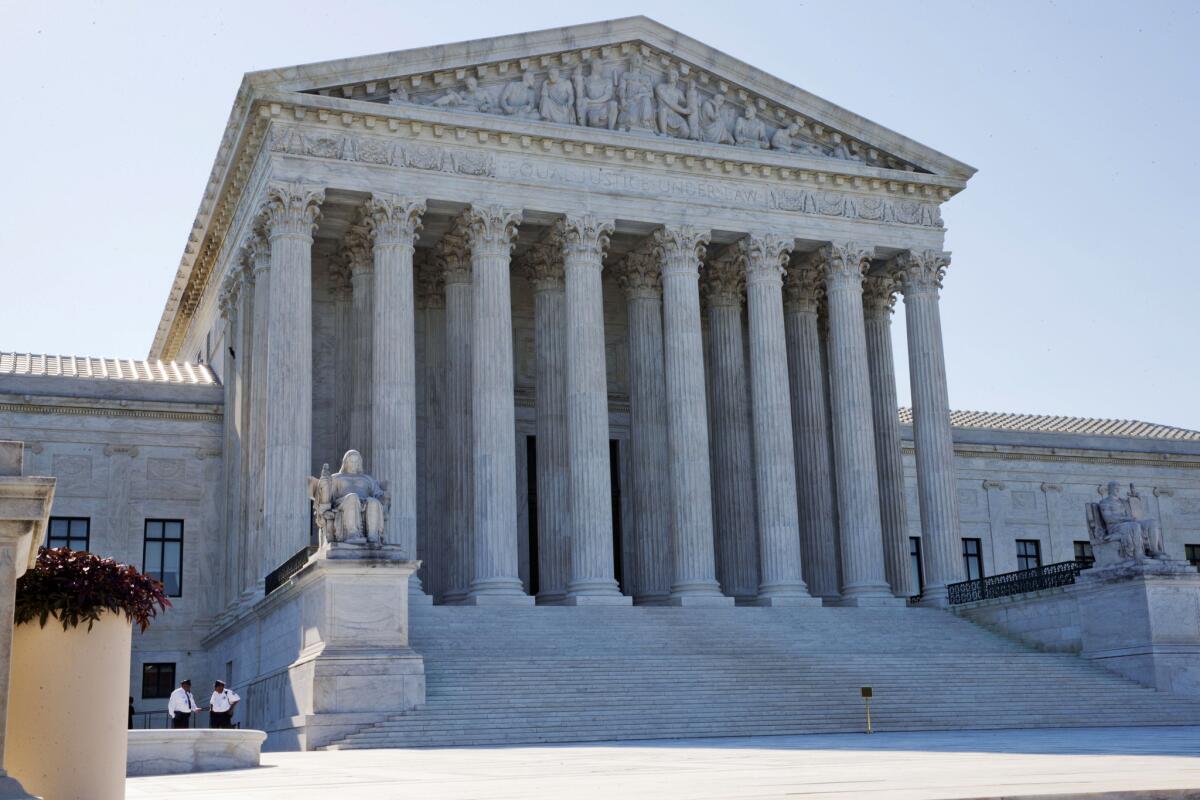Op-Ed: Do we need a constitutional convention on campaign finance?

The U.S. Supreme Court in June of 2015.
- Share via
Does the United States need a constitutional amendment to clean up the campaign finance mess created by the U.S. Supreme Court? My answer is absolutely not. That’s neither a realistic goal nor a wise way to curb the influence of the wealthy over our elections.
Nevertheless, I’m pleased that the California Supreme Court this week greenlighted a scheme to put that question on the ballot come November, and I may even vote “yes.”
In the 2010 case Citizens United vs. Federal Election Commission, the U.S. Supreme Court struck down on 1st Amendment grounds laws preventing corporations from using their general treasury funds to support or oppose candidates. The majority’s troubling constitutional analysis led to a series of other decisions, including one allowing wealthy individuals to contribute as much as they like to super PACs. As a result, we’re moving toward a plutocracy, in which the wealthiest Americans are increasingly able to protect their privileged economic position and block policy changes they don’t like.
It is much easier to...appoint different justices to the Supreme Court than it is to follow the formal paths to constitutional convention and amendment.
Another path to change is a constitutional convention. Under Article V of the Constitution, two-thirds of state legislatures can vote to call a convention to propose amendments, which three-quarters of the states must then approve.
We have never had an Article V convention, and Congress hasn’t amended the Constitution since 1992 (when it approved a change submitted in 1789). Unfazed, in 2014 the California Legislature put a measure on the ballot asking voters’ advice on whether an amendment was necessary to rid the land of Citizens United. The California Supreme Court at first nixed that popular advisory vote as beyond the Legislature’s purview; then, this week in Howard Jarvis Taxpayers Assn. vs. Padilla, it decided the move was kosher. Now the Legislature has the power to authorize a new ballot measure for November.
Danger lies ahead. Setting aside the long odds, if California and 33 more states invoke Article V, there’s a risk that we’d end up with a “runaway” convention, during which delegates would propose amendments on issues including abortion, gun rights and immigration.
Even if a convention could be limited to overturning Citizens United, existing proposals for how to word an amendment raise some issues. One would declare that only “natural persons” have constitutional rights, which would seem to allow the government to ban the printing of corporate-owned newspapers, including the Los Angeles Times.
Other proposed campaign finance amendments, including the one Democrats in the U.S. Senate supported in 2015, are equally problematic. They all seem to suffer from one of two defects: either they’re draconian (written in such a way that they could squelch important political debates), or they’re toothless (leaving matters in the hands of the same U.S. Supreme Court that decided Citizens United).
In any case, the California Legislature doesn’t really need the voters’ advice. If it did, it wouldn’t have called for a constitutional convention back in 2014. As California Supreme Court Justice Goodwin Liu noted in his concurrence in this week’s decision, “It blinks reality to suggest that the Legislature — plainly aware of opinion polls showing that broad majorities of Americans are opposed to Citizens United — enacted [the bill putting the campaign finance measure on the ballot] in order to investigate the citizenry’s views.”
What’s probably going on is that the Democratic-dominated Legislature sees an issue that is likely to excite Democratic voters and get them to the polls.
To recap: A constitutional convention could spiral out of control, proposed amendment language so far is deeply problematic, and the Legislature may have self-interested reasons for including a campaign finance question on the ballot. There is, however, a good reason for voters to support this flawed proposal.
As the majority in the Howard Jarvis case noted, a call for a constitutional amendment seems stronger when coming from millions of California voters and not just the Legislature. A symbolic vote can serve the salutary purpose of keeping the pressure on for the next president to appoint justices to the Supreme Court who will reverse Citizens United.
In these polarized times, it is much easier to change the Constitution’s meaning by appointing different justices to the Supreme Court than it is to follow the formal paths to constitutional convention and amendment.
The next president may have up to four appointments to the Supreme Court, and the fate of money in politics could well depend upon who is appointed.
Reminding the next president that the public thinks Citizens United is profoundly wrongheaded make sense — even if that means voting to recommend a misguided amendment.
Richard L. Hasen is a professor of law and political science at UC Irvine and the author of “Plutocrats United: Campaign Money, the Supreme Court, and the Distortion of American Elections.”
Follow the Opinion section on Twitter @latimesopinion and Facebook
More to Read
A cure for the common opinion
Get thought-provoking perspectives with our weekly newsletter.
You may occasionally receive promotional content from the Los Angeles Times.









